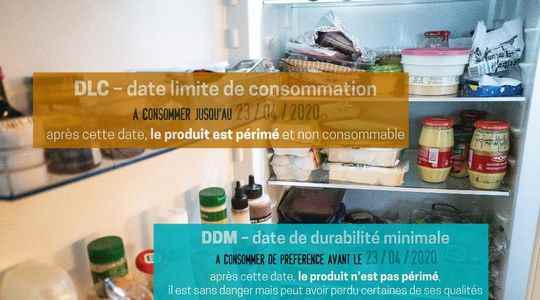Packaged vegetables and fruit, with no expiry date: this is the initiative that the supermarket chain Waitrose will be implementing in the United Kingdom, starting in September. The goal: to encourage households to keep their food longer to reduce food waste. Thus, the chain will remove the mentions “best before” (best before), an indicative date beyond which the product remains consumable without danger, on nearly 500 fresh products. “We estimate that removing these dates could save the equivalent of 7 million baskets of food,” Waitrose said in a statement.
Would such a measure be possible in France? “The first step before removing certain use-by dates is to raise consumer awareness as much as possible,” said Simon Foucault, public affairs manager at Too Good To Go. of agri-food players, launched the “consumption date pact” in 2020. Today, it includes 65 signatories, such as Carrefour, Intermarché, Danone and Nestlé. Together, they made ten commitments to reduce food waste while focusing on best-before dates. “The objective is to make the consumer understand that there are two different dates: the expiry date (DLC, “to be consumed before”), which is found on ultra-fresh products and beyond which they can no longer be consumed without health risk; and the date of minimum durability (BDD, “best before”) which is informative and present on dry products. Beyond this date, the product will have lost its organoleptic qualities (melting, crunchy or soft), but it will not present any risk to health”, explains Simon Foucault.
“Before throwing, observe, smell, taste”
According an investigation by the European Commission, 53% of French people cannot tell the difference between these two dates, which makes them responsible for 20% of food waste in homes. Large retailers then committed to setting up a major awareness campaign on social networks. On some packaging, there are also pictograms to accentuate the visual differentiation between the two dates. They indicate: “before throwing away, observe, smell, taste”, in order to encourage the consumer to use his senses. “A bit like our grandparents did with a packet of biscuits,” recalls the manager. In total, 3,000 ranges benefit from this pictogram, or 300 million products, according to Too Good To Go.
Some department store chains have gone further, such as Système U, which has decided to postpone certain dates. “We were able to do this on products from our private label thanks to our good relations with manufacturers. There is no risk”, assures Thierry Desouches, communication manager at Système U. Thus, since 2018, the chain has pushed back the DLC of fourteen days on average for 223 references (yogurts, charcuterie, etc.).
According to a study by the anti-waste association WRAP, by adding an extra day to the lifespan of products, we avoid the waste of 80,000 tonnes of foodstuffs at distributors, with a financial gain of 100 million euros. As a reminder, in France, nearly 10 million tons of edible food are thrown away each year, according to the French Environment and Energy Management Agency (Ademe).
Towards a total disappearance of DDM?
From 2018, Carrefour also extended the deadline for more than 500 products: seven days for shortcrust and puff pastry, ten for certain white cheeses, fifteen for bacon bits, or even thirty for certain desserts. The group led by Alexandre Bompard has also set up an “anti-waste” section, in which it offers products whose MDD is exceeded, at -30% or even -50%. “Typically, after the holidays, we did not manage to sell all the breads to make the toasts. So in February, they will end up at low prices in this department”, indicates Bertrand Swiderski, sustainable development director of the Carrefour group. Selling such a product is not an offense in France, but for David Rousset, general secretary of the Association Force Ouvrière consumers (Afoc), “it’s totally counter-intuitive for the customer”. The lawyer assumes it: he would like the DDM to disappear completely. “The date of minimum durability is purely indicative and set unilaterally by the manufacturers. It is not based on any standard, except perhaps marketing ulterior motives, and leads to overconsumption. If there was only one expiry date, in terms of information, readability and transparency, the consumer would be a winner.”
Problem: if the United Kingdom has been able to decide unilaterally to remove certain DDMs since Brexit, France is limited by the European regulation of 2011, says INCO, which obliges the affixing of expiry dates to all Member States and establishes the legal framework. Apart from certain products included in Annex 10, such as sugar or vinegar, all consumer product packaging must bear an expiry date. “We wrote to the European Commission to see if we could not go further by modifying the INCO regulation, specifies Bertrand Swiderski. I asked for the abolition of the DDM for dry pasta, honey, legumes, vinegared products…” Carrefour has not yet received an answer, but at European level, the subject of food waste is on the table. In the EU, approximately 87.6 million tonnes of food are lost or wasted each year.
